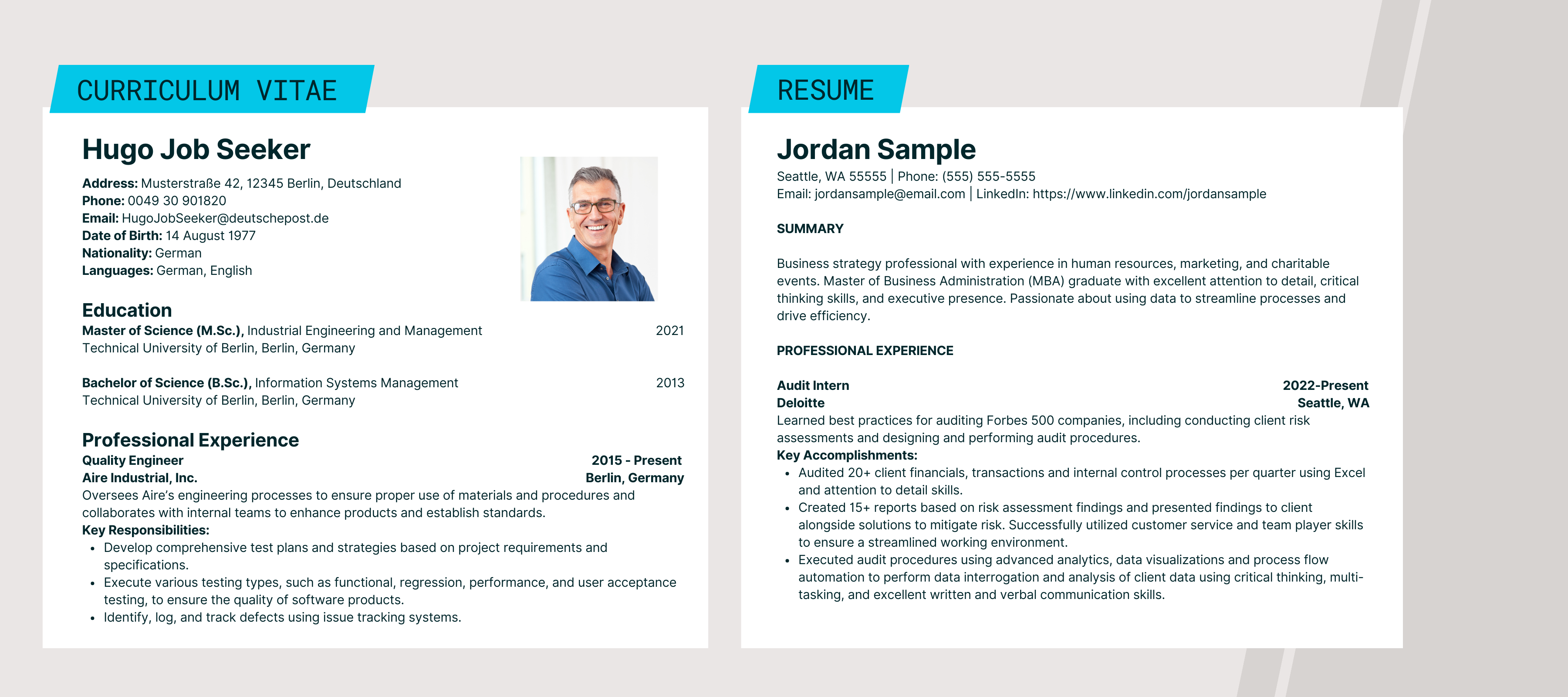In an increasingly interconnected world, the allure of working abroad is stronger than ever before. The prospect of experiencing a new culture and broadening professional horizons has piqued the interest of countless individuals seeking career advancement. However, pursuing job opportunities outside your home country requires careful consideration and preparation.
We asked our career experts for advice on navigating the complex path of seeking employment abroad. They shared valuable insights and practical tips that could pave the way for a successful venture into the international job market.
Our goal isn’t to provide a comprehensive resource of considerations by country but to highlight parts of the job search where due diligence is essential. While your qualifications are always central to the job search, international roles require extra effort to show employers that you’ve considered relevant cultural values and local norms.
Now that you recognize the significance of understanding international job markets and their nuances before entering them, we would like to explore some of those essential aspects of the global job search that merit careful consideration.
Career materials
When applying to jobs abroad, tailoring your career materials to a specific country can significantly boost your chances of success. Customization shows cultural awareness, adaptability, and a genuine interest in the local market. Adapt your resume and cover letter to align with the country’s norms and values to demonstrate your commitment to understanding and integrating into the new professional environment.
Expert advice
“Tailor your CV and cover letter to align with local standards and preferences. This includes adjusting the format, language, and content to match the expectations of employers in your new country.”
– Andrea Buwalda, career expert at edX

Expert advice
“Consider if there are any language requirements that are needed to upskill in with a certificate of attendance or language proficiency test, etc.”
– Arlette Villarreal, career expert at edX

Here are a few things to keep in mind as you curate your career materials for international markets:
Format & structure — A resume is the most common career material in the US and North America. Many resumes are created with the expectation that they will first be filtered through an automated tracking system (ATS). Because of this, a plain format is critical. An ATS-friendly resume uses black text, basic fonts, and no images, tables, or icons; its length is no longer than two pages. Photographs are included only in resumes for specific jobs, such as modeling or acting, to avoid hiring bias.
Going global
In the UK and EU, curricula vitae (CVs) are more common than resumes. As the translation “the course of one’s life” implies, CVs are comprehensive, focus on education and accomplishments, and can be very lengthy for experienced candidates. They may also contain personal information such as birthdate, nationality, marital status, and a photograph. While unusual on a typical US/North American resume, photos are preferred in some cultures where first impressions and authenticity are highly valued.
Take a look at the CV and Resume featured below.

Language & tone — Especially when it comes to cover letters, language and tone can be tricky. In the US and North America, care is taken to use non-gendered salutations and proper names when possible. A key feature of the cover letter is highlighting accomplishments and self-promoting to convince readers you are the best candidate for the role.
Going global
Mastering the intricacies of formality and hierarchy is essential to maneuvering through cultural expectations within cover letters. In certain cultures, self-promotion is perceived as disrespectful or arrogant, demanding a delicate balance between highlighting achievements and respecting norms. For instance, in African, Asian, Hispanic, and Latino cultures, modesty and humility are commendable traits that can profoundly impact job searches. Consequently, emphasizing contributions to the team or demonstrating support towards management and company objectives becomes a prudent approach in such scenarios.
Networking and relationship building
While career materials hold a lot of weight in your international job search, the way you create and manage relationships is just as, if not more, important.
According to Zippia (2022), 85% of jobs are found through networking. In the US, this includes both online professional platforms like LinkedIn and Indeed and in-person events such as networking functions, job fairs, and even family get-togethers. Successful networking and relationship building centers around confidently telling the past, present, and future of your professional journey.
Networking for jobs abroad requires thoughtful consideration of cultural differences. Understanding and respecting customs, etiquette, and communication styles can significantly impact your ability to build meaningful connections. Recognizing the value of cultural diversity and adapting your networking approach accordingly will enhance your chances of forging positive professional relationships and unlocking international career opportunities.
Going global
As you may have experienced in social interactions while traveling across borders, there is a delicate balance of formal and informal communication when networking abroad.
- Understand nonverbal cues and their cultural interpretations, body language, and personal space norms. While personal space is generally respected in the US, that is not the norm in other cultures. Also, where you sit in a meeting or event may have different interpretations across different cultures.
- Cultural hierarchies may be strictly observed in face-to-face interactions, so be aware of local customs.
- Simple customs such as handshakes can be nuanced. Some cultures view handshakes between opposite sexes as impolite or may prefer a bow or other form of acknowledgment to physical contact.
- In some cultures, it is customary to first greet the eldest member of a group as a sign of respect. Pay close attention to other professionals in attendance if you need clarification on the proper etiquette.
Expert advice
“Participate in industry-specific events, conferences, and career fairs. These events provide opportunities to network with professionals, learn about local industry trends, and potentially connect with hiring managers or recruiters.”
“Look for expat groups in your area e.g., ‘South Africans working in the UK,’ this could not only help you make friends but also connect with roles in your new city or region.”
– Andrea Buwalda, career expert at edX

Expert advice
“Get a mentor in the region/country you are trying to work [in]. This will help you to get a better vision of the market, the industry and what you need to be a competitive candidate in those markets.”
– Arlette Villarreal, career expert at edX

Other considerations
While there are many important factors to consider in your international job search, our career experts agree that understanding the legal and governmental requirements for working abroad is critical. The regulations governing proper protocols for work permits and visa requirements can vary dramatically from country to country. Being well-informed ensures compliance, safeguards legal status, and protects your financial interests.
Expert advice
“Understand the regulations/laws/red tape involved with working legally in another country. The US has very specific rules and regulations around what is required for you to obtain a work permit, employer sponsorship (H1B) or permanent residency. The US is not unique in this. Most countries have, what can sometimes be considered, a difficult to understand process for obtaining the right to work legally.
“So, the first step for us is to work on becoming educated on that process. Most countries will have their rules and regulations around obtaining proper work documentation associated with agencies that deal with immigration, citizenship, and/or travel.”
– Colin Lubbe, career expert at edX

Pursuing career opportunities abroad is a complex journey brimming with challenges and opportunities. Understanding cultural nuances and embracing the potential for personal and professional growth are essential components of the process. From mastering the art of crafting a globally fluent resume to honing cross-cultural communication skills, every step demands careful consideration. We encourage you to approach this process with an open mind, adaptability, and a willingness to embrace new experiences. Best of luck on your professional adventures!




